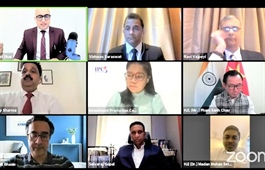Every citizen to have QR Code by 2025 in an effort to develop digital Government
Every citizen to have QR Code by 2025 in an effort to develop digital Government
Every citizen in Viet Nam will have a digital identity with a QR Code by 2025 in an effort to promote the development of digital Government. 
This will enable citizens, enterprises and other organisations to participate in the operation of Government agencies to improve transparency and service quality as well as improving social values.
This was a key point in the e-Government development strategy towards building a digital Government in the 2021-25 period approved early this week.
The strategy aimed to complete the development targets of e-Government by the end of this year to serve the formation of digital Government by 2025.
As mentioned in the strategy, e-Government included online meetings, paperless document processing, contactless administrative procedures and cashless payments.
Digital Government was a broader definiton, which included e-Government with safe operation in the digital environment, ability to provide new services, ability to optimise resources and the ability to lead the national digital transformation and effectively handle big issues in socio-economic management and development.
Digital Government was developed to let citizens, enterprises and other organisations participate in an appropriate way in the operation of Government agencies and interact to enhance transparency, improve service quality and together handle problems.
In comparision, e-Government set targets of better serve citizens and enterprises.
Minister of Information and Communications Nguyen Manh Hung said that the targets for forming e-Government would be basically completed in 2021 with the focus on enabling the provision of all public services at level 4. Level 4 is the highest level of online public services which allows users to fill and submit forms and pay fees online.
By 2025, digital Government would be formed, which would enable the provision of Government services round-the-clock following demand while new services would be provided based on the open database.
To promote the formation of the digital Government, the strategy set targets of completing the legal environment, developing the national digital infrastructure, the national digital platform, the national data and national apps together with ensuring network security and safety.
Accordingly, policies would be put forward so that Viet Nam could be in the list of the top 50 countries in terms of digital Government development by the United Nations by 2025 and in the top 30 by 2030.
Specifically, the strategy targeted that every citizen would have a digital identity with a QR Code and own a smartphone. Every household would have a digital address and could access broadband internet.
Each citizen would have a digital health record, while medical examination and treatment facilities could provide remote examination and treatment and allow cashless payments and electronic prescriptions.
Each student would have a digital record of their studies, schools allow cashless payments and provide digital learning materials. Each farmer will have the ability to access, exploit and use the digital platform for agriculture, reducing the dependence on intermediary stages from production to distribution.


























